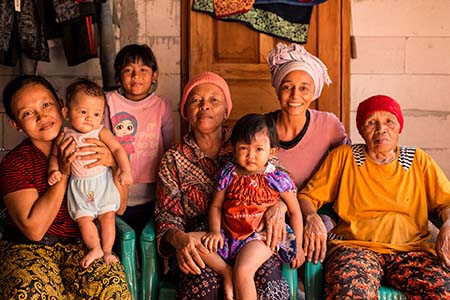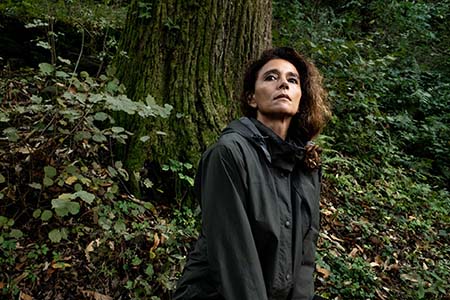This is the first in a periodic series profiling the work of journalists who have received grants from the OPC.
by Chad Bouchard
When Elisabetta Zavoli, an OPC member, grant recipient and documentary photographer born in Italy, embarked on her investigative journey, it was not amid the bustle of busy newsrooms or the rush of reporting in the field, it was in muted chemistry laboratories and photography darkrooms.
“I grew up with two great passions in my life: the love for the natural environment and the love for photography. I’ve always been an inquisitive person with a strong attitude toward scientific subjects and a taste for learning.” she said. Zavoli graduated from the University of Bologna in 2001 with a degree in environmental sciences, and then worked for eight years as a chemist in a waste treatment company.
Dissatisfied with the job’s daily grind, she decided to quit and try to recapture her nature as explorer, to “dig into what is unknown (to me), push the boundaries of conventional thinking, pose questions, unfold stories and investigate the relationships between globalization and its local effects.”
Zavoli received a master’s degree in photojournalism in 2009 from the Contrasto Agency in Milan. The same year, she moved to Algiers to document the condition of women in Algerian society. From 2012 to 2018 she worked in Jakarta as a freelance photographer on assignment and on personal long-term documentary projects about environmental and gender issues. Her work in Indonesia documenting the depletion of mangroves won the Journalism Grant for Innovation in Development Reporting from the European Journalism Centre in 2016. Her work has appeared in 42 exhibitions in 11 countries around the world.
When the COVID-19 pandemic gripped the world in early 2020, Zavoli was in her hometown of Rimini on the northeast coast of Italy. She used the time in lockdown to create a photo project with her two sons to express the “strong emotions and feelings we were going through.” The project won Pictures of the Year International (POYI) and Cortona On The Move awards, and was covered in The Cut and The New Yorker.
But freelance photojournalists can’t live on accolades, and the pandemic took a hard economic toll as newsroom budgets froze and assignments dried up.
“Being a photographer is a job that requires you to be on the location and with the people you are documenting. So, if you must stay home, how could you work and make a living?” Zavoli said.
In March 2021, Zavoli applied for and received an OPC COVID-19 micro-grant of $1,000, one of the 92 OPC grants funded by the Ford Foundation, which she recalled was a “great economic and emotional help to navigate the pandemic.” She told the OPC at the time that the OPC’s support would help her investigate the questions that COVID-19 pandemic has posed to human society,” which she felt an urgency to cover. The grant came with a free 18-month honorary membership in the OPC and an OPC press ID.

When her honorary membership expired at the end of September 2022, Zavoli stepped up to become a full, dues-paying member. She said OPC membership is “an important recognition of professionalism for me and for the international media outlets where I publish the reports I’ve been working on. OPC is an extraordinary environment for professionals to keep up to date, share information and expertise, and access to professional training.”
Reflecting on the OPC help that she received, she said the grant also helped her psychologically. “I felt not alone in facing a very difficult moment, I felt a community who was interested in me as a professional and cared for me as well as for many other freelancers in need,” she said.
Zavoli’s work focuses on complicated relationships between humans and their surrounding environment, and on covering marginalized communities. She documented the lives of Waria, or Indonesian transgender women, in a project titled “Velvet Butterflies.”
“Working with the community of transgender women in Jakarta had a huge human impact on me, reaffirming once more how enriching is diversity and how fundamental is to celebrate it.” She said she wants to push for “more diversified storytelling in order to bring different perspectives into the global news industry.”
She said for her project on marine plastic litter in Indonesia, she traveled far upstream from the coast to one of Jakarta’s largest landfills, where she documented the life of Mak Muji, “an extraordinary woman and trash picker, who was the only midwife for some 18,000 villagers living around and inside the landfill, where pregnant women give birth among trash. She followed her for a full year, visiting twice per week.
“To me, her story was an extraordinary example of love and resilience, in the face of the striking contrast between the strength of life and the place where society has decided to dispose of what is considered not needed anymore.”
In September this year Zavoli received some welcome professional news. In March, she applied for a National Geographic Grant Level I with a project about Callinectes sapidus, or “blue crab,” an Atlantic species that invades the Mediterranean Sea, posing threats to local ecosystems, as well as the fishing and tourism economies that depend on them. Her proposal to follow this story in Italy, Greece and Croatia was accepted, and as a National Geographic explorer she will now receive funding to produce her project in 2023.

